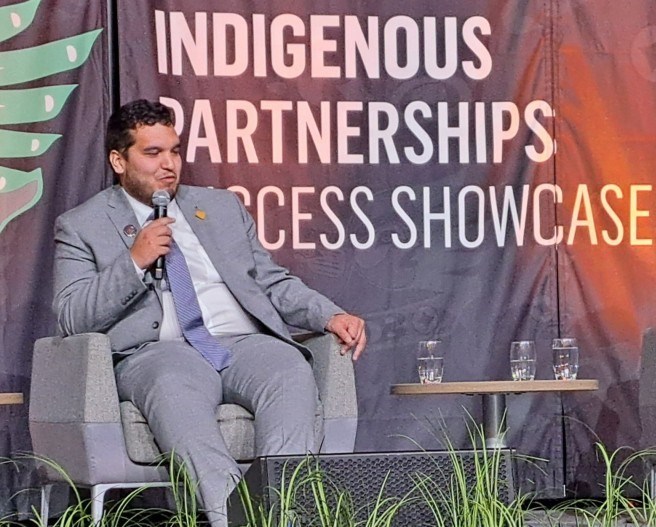A group of coastal First Nations involved in the salmon farming industry were in Ottawa today to lobby the federal government for nine-year licences for open-net fish farms and funding for a proposed new aquatic health sciences centre with an indigenous focus.
The majority of First Nations in B.C. are opposed to open-net salmon farms, and the First Nation Wild Salmon Alliance has been lobbying for the Trudeau government to make good on its pledge to end open-net salmon farming in B.C. They fear salmon farms have contributed to a decline of wild salmon by transmitting disease to wild stocks.
But a number of Coastal First Nations support the industry, and say the concerns over farmed salmon are largely the creation of "activists."
First Nations groups on either side of the issue have been holding dueling press conferences in Vancouver and Ottawa and vigorously lobbying the fisheries minister over the past few months.
The Trudeau government plans to phase out open-net salmon farms in B.C. (but not in Atlantic Canada), and the federal fisheries minister has been ordered to have a plan in place for a “transition” by 2025.
Earlier this month, a number of B.C. chiefs were in Ottawa to lobby Fisheries Minister Diane Lebouthillier to make good on the prime minister’s pledge to phase out open-net salmon farms.
Given that land-based salmon farming is unlikely to be developed in B.C. on any kind of large scale anytime soon, due to their high capital and operating costs, and land and power requirements, phasing out open-net salmon farms in B.C. would effectively kill the salmon farming sector in B.C.
The salmon farming industry has been pushing for a middle way – something that allows open net salmon farms to continue operating, but with processes and technology that limit interactions between wild and farmed salmon, to address concerns about disease and sea lice transmission.
This morning, the Coalition of First Nations for Finfish Stewardship was in Ottawa to lobby for this middle way approach.
Forty per cent of the salmon farms in B.C. have already been shut down, said coalition spokesman Dallas Smith. Those that are left enjoy the support of First Nations, he said.
“It’s important for all Canadians to know that, of all the existing salmon farms remaining in British Columbia, 100 per cent are supported by the First Nations communities that they operate in,” Smith said.
“We’ve seen a 40 per cent decline in salmon farming operations in our territories over the last four years. The unemployment that is rising in our territories has led us out here today.
“For far too long activist voices have been the determining factor in how government has been making decisions on this necessary industry and our territories.”
Isaiah Robinson, councillor for the Kitasoo Xai’Xais, said aquaculture is extremely important to his community's economy.
The Kitasoo Xai’Xais business, Kitasoo Seafoods, is a major employer in Klemtu, north of Bella Bella. It holds several commercial wild seafood licences, six salmon farm tenures, and operates two seafood processing plants, one of which processes farmed salmon.
“This overall industry supports (a) 99 per cent employment rate within my community and 51 per cent of its overall economy is represented within this sector,” Robinson said. “It makes no sense to shut this industry down. There is no industry that fill this space in such a remote community.”
The coalition has developed what it calls an “indigenous-led finfish aquaculture transition framework.” That framework includes nine-year federal licences for the remaining salmon farms operating in B.C.
In order to invest in the processes and technology that might address some of the concerns over fish farms -- in-ocean barriers for salmon farms that limit interaction between wild and farmed salmon, for example – the industry needs some certainty it won't be shut down in 2025.
“We need the certainty and the long enough runway to be able to bring in future transition opportunities with technology and other creative processes to make sure that we continue to limit the impact on wild salmon,” Smith said.
The coalition is also asking for funding for a proposed new Indigenous Centre for Aquatic Health Science.
“We’re developing the Indigenous Centre for Aquatic Health Science to help us bridge the gap between traditional ecological knowledge and Western science,” Smith said.





